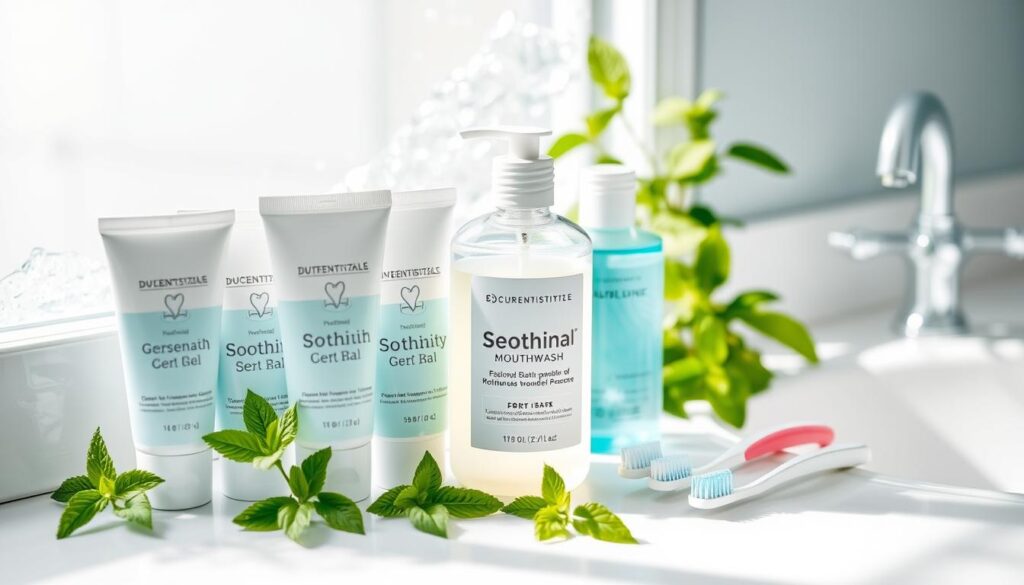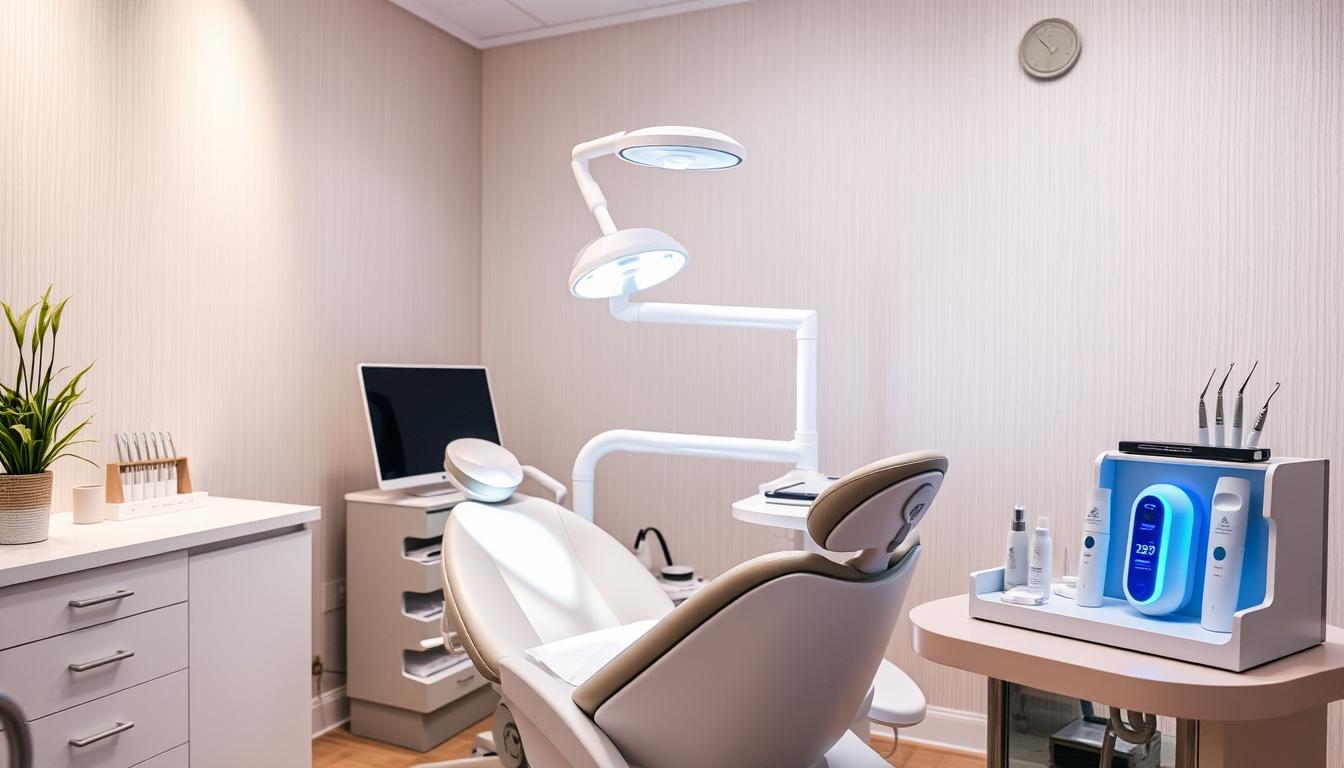Many people want a brighter smile, and professional teeth whitening is a popular choice. But, sensitivity is a common worry during and after whitening. It can be mild or very painful. It’s important to find ways to avoid this discomfort for a successful whitening.
In this article, we’ll look at why teeth whitening can cause sensitivity. We’ll also explore different whitening options and share tips to prevent and manage discomfort. By knowing what causes sensitivity and taking steps to prevent it, you can get the smile you want without pain.
Key Takeaways
- Teeth whitening sensitivity is a common concern, but it can be effectively managed.
- Understanding the causes of sensitivity can help you choose the right whitening treatment and prepare for a comfortable experience.
- Proper oral hygiene, the use of desensitizing products, and adjustments to your diet and lifestyle can all play a role in preventing and reducing sensitivity.
- Working closely with your dentist and following their recommendations is essential for minimizing discomfort and achieving the best results.
- With the right approach, you can enjoy the benefits of a whiter smile without the worry of persistent sensitivity.
Understanding Teeth Whitening Sensitivity
Teeth whitening is a common cosmetic treatment. But, it can cause temporary sensitivity for many. Let’s look at why this happens and the symptoms you might see.
What Causes Sensitivity During Whitening?
The main reason for sensitivity is the chemicals in whitening products. Hydrogen peroxide and carbamide peroxide can weaken tooth enamel. This makes the dentin layer beneath more sensitive. You might feel pain when eating or drinking hot, cold, or acidic things.
Common Symptoms of Teeth Sensitivity
People getting teeth whitened might notice several symptoms. These include:
- Sharp, shooting pain in the teeth
- Increased sensitivity to hot, cold, or sweet stimuli
- Discomfort or pain when brushing or flossing
- Gum irritation or inflammation
The severity and how long these symptoms last can vary. It depends on your dental health, the whitening product’s strength, and how long you use it.
| Causes of Teeth Whitening Sensitivity | Symptoms of Teeth Sensitivity |
|---|---|
|
|
Knowing why teeth whitening causes sensitivity is key. It helps you prepare and manage any discomfort. This way, you can enjoy the whitening process without too much pain.
Preparing for Professional Teeth Whitening
To get ready for professional teeth whitening, it’s important to prepare your teeth and gums. Follow these tips to avoid sensitivity and get the best results.
- First, visit your dentist for a full check-up. They will check your teeth and gums and suggest the best whitening treatment for you.
- Start using a desensitizing toothpaste a few weeks before your appointment. This can help make your teeth less sensitive during the whitening.
- Try to avoid foods and drinks that can stain your teeth, like coffee, tea, and red wine. Also, skip foods with strong colors a few days before your treatment.
- Talk to your dentist about any worries or questions you have. They can give you advice on how to prepare for professional teeth whitening and reduce whitening sensitivity.
By taking these steps, you’ll be ready for a brighter smile with little discomfort. Remember, talking openly with your dentist is key to a great whitening experience.
| Step | Description |
|---|---|
| Dental Exam | Get a full check-up to see how your teeth and gums are doing. |
| Desensitizing Toothpaste | Use a toothpaste for sensitive teeth for a few weeks before your treatment. |
| Dietary Adjustments | Stay away from acidic or staining foods and drinks a few days before your appointment. |
| Communication with Dentist | Talk to your dentist about any concerns or questions you have for a smooth whitening experience. |
By following these steps, you’ll be ready for your professional teeth whitening treatment. You’ll get a brighter smile with little whitening sensitivity.
“Proper preparation is the key to a successful and comfortable professional teeth whitening experience.”
Choosing the Right Whitening Treatment
When looking at professional teeth whitening, you have two main choices: in-office whitening and at-home kits. Each has its own benefits and risks of sensitivity. It’s important to think about these carefully to find the best option for you.
In-Office Whitening vs. At-Home Kits
In-office whitening is done by a dentist and can give quick, dramatic results. The dentist uses strong whitening gel and special lights to speed up the process. This is great for those who want a fast smile change.
At-home kits, on the other hand, let you whiten your teeth at home. They have less strong whitening agents and need regular use over weeks or months. They are often cheaper and offer a gradual, gentle change.
Factors to Consider for Sensitivity
When picking a whitening option, sensitivity is a big factor. Both in-office and at-home treatments can cause sensitivity, but the level can vary. Things that can change how sensitive you might get include:
- The concentration of the whitening agent
- The length of the whitening treatment
- Your natural tooth and gum sensitivity
- Any dental work or conditions you have
Talking to your dentist about your sensitivity worries is key. They can help pick the best whitening method for you and reduce any discomfort.
Preventing professional teeth whitening sensitivity
Professional teeth whitening can make your smile brighter and more radiant. But, many people experience teeth sensitivity afterward. Luckily, there are ways to lessen discomfort and prevent sensitivity during whitening.
Using desensitizing agents before and after whitening is key. These products, like toothpastes or gels, contain ingredients that block pain pathways. They create a barrier to reduce discomfort.
Keeping up with proper oral hygiene is also vital. Brushing and flossing regularly removes plaque and bacteria that can make sensitivity worse. Use a soft-bristled toothbrush and avoid harsh scrubbing to protect your enamel.
Changing your diet and lifestyle can also help. Avoid acidic and dark foods like citrus fruits, coffee, and red wine. Staying hydrated and using a straw can also help protect sensitive areas.
“Taking proactive steps to manage sensitivity before and during professional teeth whitening can make the process more comfortable and ensure long-lasting results.”
By following these tips, you can prevent teeth whitening sensitivity, minimize discomfort, and enjoy a brighter smile.
Proper Oral Hygiene Routine
Keeping your mouth clean is key when you’re getting your teeth whitened. Brushing and flossing before your treatment makes sure your teeth are ready. It also helps avoid any pain or sensitivity.
Importance of Brushing and Flossing
Brushing and flossing are vital for your teeth and gums. They help your whitening treatment work better. Here’s why:
- They remove plaque and debris that can block whitening
- They keep your teeth and gums healthy, avoiding sensitivity
- They make sure your teeth are clean and ready for whitening agents
- They support your oral health before and after whitening
Adding a good brushing and flossing routine to your care helps a lot. It keeps your teeth white and healthy. It also reduces brushing and flossing before whitening sensitivity.
“Proper oral hygiene is the foundation for a successful and comfortable teeth whitening experience.”
Using Desensitizing Products
Desensitizing products like toothpastes and gels can help prevent teeth whitening sensitivity. They are made to tackle the pain and discomfort that whitening can cause. These products are key to a pain-free whitening experience.
Toothpastes and Gels for Sensitive Teeth
Toothpastes and gels for sensitive teeth have special ingredients. They include potassium nitrate, arginine, or strontium chloride. These ingredients help block pain signals from the teeth’s nerves.
They work by sealing the tiny tubules in the dentin. This stops irritants from reaching the sensitive areas. This way, they reduce whitening sensitivity.
- Potassium nitrate-based toothpastes help to desensitize the teeth and alleviate discomfort during and after whitening treatments.
- Arginine-containing gels create a protective barrier over the exposed dentin, reducing sensitivity and enhancing the whitening experience.
- Strontium chloride-infused products work by diminishing the transmission of pain signals from the nerves, providing relief from sensitivity.
Using desensitizing products for teeth whitening before and after whitening can make a big difference. It ensures a comfortable and effective whitening treatment.

“Investing in the right toothpaste and gels for sensitive teeth can make all the difference in your whitening journey, helping to reduce whitening sensitivity and ensure a positive outcome.”
Adjusting Your Diet and Lifestyle
Changing your diet and lifestyle can help prevent and manage sensitivity during teeth whitening. Being careful about what you eat and drink is key. It supports a successful and comfortable whitening treatment.
Acidic foods and drinks can weaken your enamel, making teeth more sensitive. Foods and habits that affect whitening sensitivity include citrus fruits, tomatoes, wine, and carbonated drinks. Avoid these for a few days before and after whitening to manage sensitivity.
Changing your lifestyle can also help. Good oral hygiene, like using a soft-bristled toothbrush and flossing, keeps teeth and gums healthy. This reduces sensitivity. Relaxation techniques, such as meditation or deep breathing, can also help manage discomfort or sensitivity during whitening.
- Avoid acidic foods and drinks like citrus fruits, tomatoes, wine, and carbonated beverages for a few days before and after whitening
- Maintain good oral hygiene with a soft-bristled toothbrush and regular flossing
- Practice relaxation techniques to manage any discomfort or sensitivity
By making these diet and lifestyle changes for teeth whitening, you can prevent and manage sensitivity. This ensures a more comfortable and successful whitening experience.
Managing Sensitivity After Whitening
Feeling sensitivity after teeth whitening is common. But, there are ways to ease the pain and recover smoothly. Knowing the reasons and using the right methods can help you enjoy your whiter smile without pain.
Tips for Relief and Recovery
Here are some tips to help with whitening sensitivity:
- Use a desensitizing toothpaste or gel made for sensitive teeth. These products block the nerve signals, reducing pain.
- Take an over-the-counter pain medication like ibuprofen or acetaminophen to ease any pain.
- Hydrate by drinking water.
- Stay away from extremely hot or cold foods and drinks to avoid making sensitivity worse.
- Brush your teeth gently with a soft-bristled toothbrush and use a gentle, non-abrasive toothpaste.
By following these tips and being patient, you can recover from teeth whitening discomfort. You’ll soon have a brighter, more confident smile.

“The key to managing whitening sensitivity is to be proactive and address it promptly. By taking the right steps, you can minimize discomfort and get back to enjoying your whiter, healthier-looking teeth.”
Professional Advice and Follow-Up Care
Working closely with your dentist is key for professional teeth whitening. They offer personalized advice to make sure your whitening goes smoothly. They check your oral health, pick the best treatment for you, and watch your progress.
It’s important to see your dentist regularly after whitening. They check how well the whitening worked, look for sensitivity, and adjust your treatment if needed. They might suggest desensitizing products or changes in your oral care routine.
Talking openly with your dentist is crucial. Share any worries or questions you have about whitening, sensitivity, or keeping your teeth white. With their help, you can have a safe, effective, and comfortable whitening experience.
FAQ
What causes sensitivity during professional teeth whitening?
The whitening process can make teeth more sensitive. This happens because the chemicals used can temporarily dehydrate the tooth. Symptoms include sharp pain and sensitivity to hot and cold, plus gum irritation.
How can I prepare for a professional teeth whitening treatment to minimize sensitivity?
Start by getting a dental exam before your treatment. Use toothpaste made for sensitive teeth. Also, avoid foods and drinks that can make sensitivity worse in the days before.
What are the differences between in-office whitening and at-home whitening kits when it comes to sensitivity?
In-office treatments use stronger whitening agents, which can cause more sensitivity. At-home kits have lower concentrations and are gentler. But, the type of agent and how it’s applied also play a role in sensitivity.
How can I prevent sensitivity during professional teeth whitening?
To avoid sensitivity, use products for sensitive teeth and keep your mouth clean. Brush and floss regularly and use toothpaste for sensitivity. Also, avoid certain foods and drinks to help.
What should I do if I experience sensitivity after my professional teeth whitening treatment?
If you feel sensitivity, use products for sensitive teeth and take pain medication. Stay away from hot or cold foods and drinks. Talk to your dentist for advice and care to help you recover.
Why is it important to seek professional advice and follow-up care for professional teeth whitening?
Getting advice from your dentist is key. They can give you personalized tips and check-ups. Your dentist ensures your whitening is successful and comfortable, and helps you keep your smile bright.

